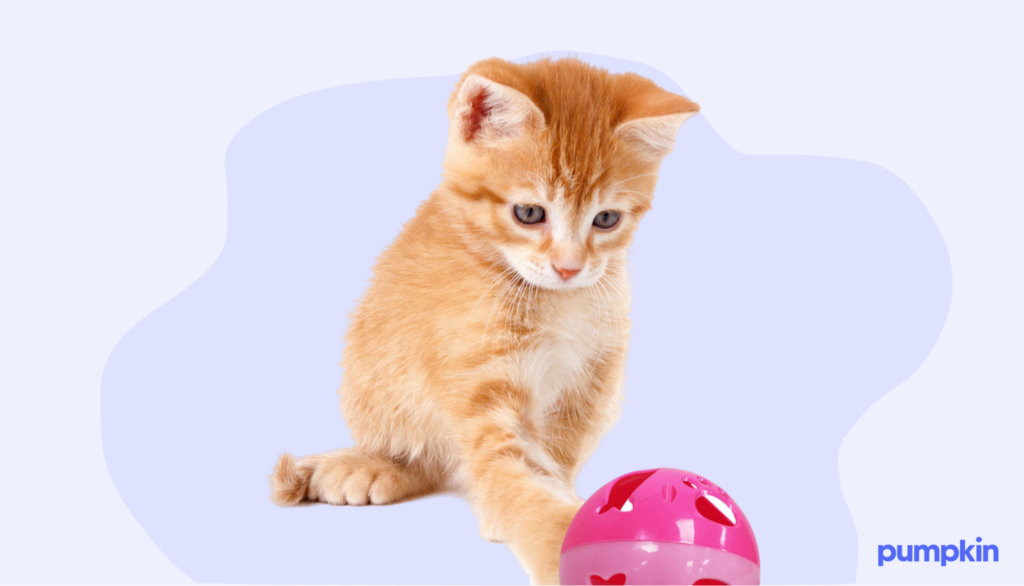Key Points
- Your cat licks you for emotional connection, to get your attention, to seek comfort, and to deal with anxiety or stress.
- If you’re not comfortable with this behavior, you can try cuddling, petting, feeding, or playing with your cat.
- While it’s generally safe to let your cat lick you, it might hurt sometimes.
Everyone knows the distinct feeling of a cat’s rough tongue. Their tongues are covered in “papillae,” small bumps on the surface of the tongue. Cats spend 30% to 50% of the day grooming themselves, and these papillae are useful for keeping their fur clean.
But why is your cat licking you?
Researchers, veterinarians, and cat behavior experts have identified some common reasons that explain why your cat is licking you repeatedly. These reasons range from mushy and affectionate to downright problematic. To decode their licks, you’ll need to pay attention to the subtle clues your cat is giving you.

1. To show affection
Licking doesn’t just carry out the function of grooming; it is also a way for cats to communicate their love for you. To put it simply, your cat is creating a social bond by licking you. This sign of affection may stem from kittenhood when your cat’s mother licked them to show care and affection. Many cats carry this behavior into their adult lives, licking their humans and other bonded pets to pass along that same sentiment.
2. To mark their territory
Cats claim something as their own through behaviors like cheek rubbing, scratching, spraying, kneading, and licking. When they lick you, it could be because your cat wants to send a message loud and clear to other cats or animals: You belong to your cat, and your cat alone.
3. To groom you
Your kitty might not realize that licking you doesn’t actually help you “get clean,” but in their mind, they’re doing you a favor — and not because they think you’re dirty. This social behavior is completely natural to them. Mother cats groom their kittens to teach them how to do it for themselves, show them affection, and create a bond. Also known as allogrooming, this is a common behavior among many mammals and birds.
In fact, a group of cats living together often designate an “allo-groomer” — a cat that licks and grooms the other cats in the group.
4. To taste something interesting
As simple (and even silly) as it may seem, your cat may be licking you because they taste something they like on your skin. You may have spilled something or come into contact with a food that left a residue on your skin.
If it’s warm or you’ve been exercising, it could be that your sweat has left a salty residue, and that’s what your cat is trying to taste.
5. To get your attention
Your cat may also lick you to get your attention. Whether they want you to pet them, feed them, or pick them up, this behavior could be their attempt to put your focus where it rightly belongs — on them. In this case, licking is similar to pawing, meowing, kneading, and other forms of attention-seeking feline behavior.
6. To cope with anxiety or stress
Your cat might lick you because they’re anxious or stressed. Although excessive licking or grooming can indicate a common cat behavioral problem or a medical issue, cats often lick you or themselves as a coping mechanism for stress or anxiety.
You might find your cat licking you after moving to a new home or experiencing a change in their environment. This form of licking isn’t a problem unless it happens so frequently that your cat’s skin becomes raw or is inhabited by bald spots.
7. To gain the comfort that they once got from nursing

If kittens are separated too early from their mothers, they are prone to developing long-term stress. To deal with this stress, they sometimes put their mouths around a body part (like a finger or an earlobe) for comfort. This behavior is similar to nursing, which puts them at ease.
The nurturing behavior of pet parents has been found to increase juvenile or neotenous behavior in cats, including licking for comfort. Neotony refers to a juvenile behavior that persists into adulthood, and it’s very common in domesticated animals. This phenomenon also explains why cats knead.
8. To get you to leave them alone
News flash: Your cat might actually be annoyed by some behaviors you’re displaying. To be specific, you might be holding or stroking your cat excessively. Your four-legged friend might then start to lick you to fend you off.
Be warned — your cat probably isn’t playing around. The licking could very well be a warning sign; if you don’t heed it, you might get bitten or scratched.
9. To simply feel good
Sometimes, your cat’s behavior is governed by good old-fashioned positive reinforcement. Case in point: When your cat licks you, their brain releases endorphins. The “feel-good” sensation of endorphins might make your cat want to lick you repeatedly.
In a similar way, if you respond positively and affectionately when your cat starts licking you, then you will reinforce this behavior, leading to more licking in the future.
How do I get my cat to stop licking me?
Unless your cat is repeatedly licking you and grooming excessively, licking usually isn’t anything to worry about. In fact, you may even enjoy this natural cat behavior. However, it might be unpleasant to have your cat constantly licking you due to the rough texture of their tongue.
If you’re looking to curb this behavior, the best thing you can do is try to redirect their attention. Perhaps you can cuddle or start petting your cat so that they won’t have to think about licking themselves too much. You can also try to move away from your cat whenever licking becomes excessive.

Playing with your cat can help curb licking as they love when you interact and spend quality time with them. Younger cats can play 10 times or more within a single day, while older cats will enjoy three or four instances of play.
If playing doesn’t quite work, try offering a food treat. This should only be a Plan B since too many treats might compromise your cat’s diet.
While licking is normal cat behavior (and often a sign of love), it is best to reach out to your veterinarian for advice if you’re concerned with their behavior at any time.
When your cat licks you, read the signs
As far as your cat is concerned, licking is a multifaceted form of communication. It could be a sign of affection or an indication that they want food or attention. It could also point to anxiety or even annoyance.
Learn to read your cat’s behavior and mood so you know which is which. Respond accordingly, all will be well.
Life with a cat can be full of surprises. With a cat insurance plan in place, you can get help paying for future vet bills from unexpected accidents and illnesses.
FAQs
- https://www.vet.cornell.edu/departments-centers-and-institutes/cornell-feline-health-center/health-information/feline-health-topics/cats-lick-too-much
- https://www.tvmf.org/articles/grooming-behavior-of-cats/
- https://consciouscat.net/cats-groom/
- https://corpora.tika.apache.org/base/docs/bug_trackers/ocrmypdf/ocrmypdf-LINK-325-44.pdf
- https://pmc.ncbi.nlm.nih.gov/articles/PMC7577203/
- https://ecommons.udayton.edu/cgi/viewcontent.cgi?article=2291&context=stander_posters
- https://academyanimal.com/news/too-much-licking
- https://www.cats.org.uk/help-and-advice/cat-behaviour/cats-and-play




